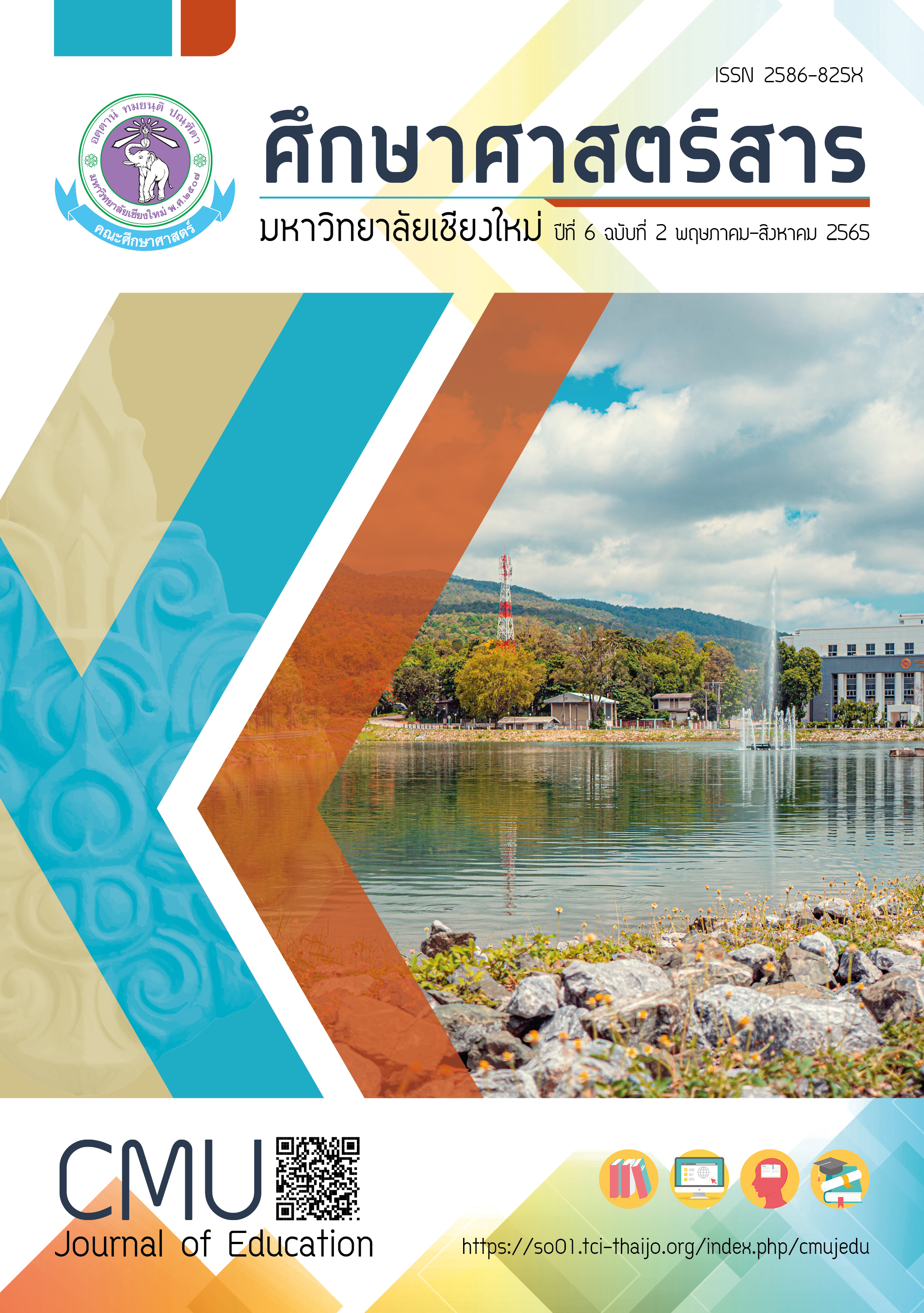ผลของเพศที่มีต่อการโต้แย้งทางวิทยาศาสตร์ของนักเรียนชั้นมัธยมศึกษาปีที่ 5 ที่เรียนรู้ผ่านการสืบเสาะที่ขับเคลื่อนด้วยกลวิธีการโต้แย้ง เรื่อง สารละลายอิเล็กโทรไลต์
Main Article Content
บทคัดย่อ
การโต้แย้งทางวิทยาศาสตร์มีบทบาทสำคัญต่อการเรียนรู้วิทยาศาสตร์ เนื่องจากเปิดโอกาสให้นักเรียนได้ปฏิบัติการทางวิทยาศาสตร์ สนับสนุนให้นักเรียนได้แสดงความคิดเห็น และอภิปรายกันในชั้นเรียน โดยอาศัยหลักฐานเชิงประจักษ์ การให้เหตุผลเพื่อสนับสนุนข้อกล่าวอ้าง และการสื่อสารระหว่างกลุ่มด้วยแนวคิดที่แตกต่างกันจนนำไปสู่การลงข้อสรุปที่ถูกต้องและเป็นที่ยอมรับร่วมกัน งานวิจัยนี้มีวัตถุประสงค์เพื่อศึกษาเพศที่มีผลต่อการโต้แย้งทางวิทยาศาสตร์ของนักเรียนที่ผ่านการจัดการเรียนรู้แบบสืบเสาะที่ขับเคลื่อนด้วยกลวิธีการโต้แย้ง เรื่อง สารละลายอิเล็กโทรไลต์ กลุ่มที่ศึกษาเป็นนักเรียนชั้นมัธยมศึกษาปีที่ 5 จำนวน 12 คน กำลังศึกษาที่โรงเรียนแห่งหนึ่งในจังหวัดกาฬสินธุ์ ข้อมูลที่ใช้ในงานวิจัยนี้เก็บรวบรวมจากการบันทึกวีดิทัศน์ และแบบบันทึกการโต้แย้งทางวิทยาศาสตร์ ผลการศึกษาครั้งนี้พบว่า เพศไม่ได้ส่งผลต่อการโต้แย้งทางวิทยาศาสตร์ของนักเรียน แต่เพศมีผลต่อการทำงานร่วมกันของนักเรียน กลุ่มคละนักเรียนชายและหญิงสามารถระบุองค์ประกอบของการโต้แย้งทางวิทยาศาสตร์ได้ครบถ้วน ทำให้มีคุณภาพของการโต้แย้งทางวิทยาศาสตร์สูงกว่ากลุ่มนักเรียนชายล้วนและหญิงล้วน จากข้อค้นพบนี้การจัดการเรียนรู้แบบสืบเสาะที่ขับเคลื่อนด้วยกลวิธีการโต้แย้งจึงควรเป็นวิธีการสอนที่ให้นักเรียนได้มีโอกาสออกแบบ สำรวจตรวจสอบ รวบรวมหลักฐาน สื่อสารและร่วมกันสร้างข้อโต้แย้งกันในกลุ่มที่เหมาะสม
Article Details

อนุญาตภายใต้เงื่อนไข Creative Commons Attribution-NonCommercial-NoDerivatives 4.0 International License.
หากผู้เสนอบทความมีความจำเป็นเร่งด่วนในการตีพิมพ์โปรดส่งลงตีพิมพ์ในวารสารฉบับอื่นแทน โดยกองบรรณาธิการจะไม่รับบทความหากผู้เสนอบทความไม่ปฏิบัติตามเงื่อนไขและขั้นตอนที่กำหนดอย่างเคร่งครัด ข้อมูลของเนื้อหาในบทความถือเป็นลิขสิทธิ์ของ Journal of Inclusive and Innovative Education คณะศึกษาศาสตร์ มหาวิทยาลัยเชียงใหม่
เอกสารอ้างอิง
ชาตรี ฝ่ายคำตา. (2561). วัฒนธรรมการเรียนรู้วิชาวิทยาศาสตร์ของนักเรียนไทย. วารสารวิชาการศึกษาศาสตร์, 19(1), 43-53.
วนิดา ผาระนัด และประสาท เนืองเฉลิม. (2561). การโต้แย้งอย่างมีเหตุผล: ทักษะเพื่อการดำรงชีวิตในศตวรรษที่ 21. วารสารมนุษยศาสตร์และสังคมศาสตร์ มหาวิทยาลัยมหาสารคาม, 37(2), 174-181.
สถาบันส่งเสริมการสอนวิทยาศาสตร์และเทคโนโลยี. (2561). ผลการประเมิน PISA 2015 วิทยาศาสตร์ การอ่าน และคณิตศาสตร์ ความเป็นเลิศและความเท่าเทียมทางการศึกษา. กรุงเทพฯ: สถาบันส่งเสริมการสอนวิทยาศาสตร์และเทคโนโลยี.
สุนีย์ คล้ายนิล, ปรีชาญ เดชศรี และอัมพลิกา ประโมจนีย์. (2551). ความรู้และสมรรถนะทางวิทยาศาสตร์สำหรับโลกวันพรุ่งนี้. กรุงเทพฯ: สถาบันส่งเสริมการสอนวิทยาศาสตร์และเทคโนโลยี.
Annisa, N., Hernani, & Taufik, R. (2016). Argument-Driven Inquiry (ADI): The way to develop junior high school student’s argumentation skills in science learning. Advances in Social Science, Education and Humanities Research (ASSEHR), 57(1), 128-132.
Asterhan, C. S. C., Schwarz, B. B., & Gil, J. (2012). Small-group, computer-mediated argumentation in middle-school classrooms: The effects of gender and different types of online teacher guidance. British Journal of Educational Psychology, 82, 375–397.
Berland, L. K., & Lee, V. R. (2012). In pursuit of consensus: Disagreement and legitimization during small-group argumentation. International Journal of Science Education, 34(12), 1857-1882.
Berland, L. K., & McNeill, K. L. (2010). A learning progression for scientific argumentation: Understanding student work and designing supportive instructional contexts. Science Education, 94(5), 756-793.
Chen, H. T., Wang, H. H., Lu, Y. Y., Lin, H. S., & Hong, Z. R. (2016). Using a modified argument-driven inquiry to promote elementary school students’ engagement in learning science and argumentation. International Journal of Science Education, 38(2), 170-191.
Chen, H. T., Wang, H. H., Lu, Y. Y., & Hong, Z. R. (2019). Bridging the gender gap of children’s engagement in learning science and argumentation through a modified argument-driven inquiry. International Journal of Science and Mathematics Education, 17, 635–655.
Driessen, G., & Langen, A. (2013). Gender differences in primary and secondary education: Are girls really outperforming boys?. International Review Of Education / Internationale Zeitschrift Für Erziehungswissenschaft, 59(1), 67-86.
Faikhamta, C., & Ladachart, L. (2016). Science Education Research and Practice in Asia: Challenges and Opportunities. Science education in Thailand: Moving through crisis to opportunity. Singapore: Springer.
Hsu, P. S., Dyke, M. V., & Smith, T. J. (2017). The effect of varied gender groupings on argumentation skills among middle school students in different cultures. Middle Grades Review, 3(2), 1-22.
Kulatunga, U., Moog, R. S., & Lewis, J. E. (2013). Argumentation and participation patterns in general chemistry peer-led sessions. Journal of Research in Science Teaching, 50(10), 1207–1231.
Lathifa, U. (2018). Correcting students’ misconception in acid and base concept using PDEODE instruction strategy. Unnes Science Education Journal, 7(2), 170-177.
Lubben, F., Sadeck, M., Scholtz, Z., & Braund, M. (2009). Gauging students’ untutored ability in argumentation about experimental data: A South African case study. International Journal of Science Education, 32(16), 1-24.
Organisation for Economic Co-operation and Development. (2016). Education at a Glance 2016: OECD Indicators. Paris: OECD Publishing.
Orgill, M. K., & Sutherland, A. (2008). Undergraduate chemistry students’ perceptions of and misconceptions about buffers and buffer problems. Chemical Education Research and Practice, 9, 131-143.
Pharanat, W., Nuangchalerm, P. & Sonsupap, K. (2015). Promoting reasoned Argumentation in Science for Lower Secondary Students. Educational Research and Reviews. 10(3), 357-362.
Sampson, V., Grooms, J., & Walker, J. (2009). Argument-driven inquiry: A way to promote learning laboratory activities. The Science Teacher, 76(8), 42-47.
Sampson, V., & Schleigh, S. (2013). Scientific Argumentation in Biology: 30 classroom activities. Arlington, VA: NSTA.
Sheppard, K. (2008). High school students’ understanding of titrations and related acid-base phenomena. Chemical Education Research and Practice, 7, 32-45.
Songsil, W., Pongsophon, P., Boonsoong, B., & Clarke, A. (2019). Developing scientific argumentation strategies using revised argument-driven inquiry (rADI) in science classrooms in Thailand. Asia-Pacific Science Education, 5(7), 1-22.
Toulmin, S. E. (2003). The use of argument. Cambridge: Cambridge University Press.
Tuba, D., & Sedat, U. (2015). Investigating the effect of argument-driven inquiry in laboratory instruction. Educational Sciences Theory & practice, 15(1), 267-283.
Walker, J. P., Sampson, V., Groom, J., Anderson, B., & Zimmerman, C. O. (2010). Argument-Driven Inquiry in undergraduate chemistry labs: The impact on students’ conceptual understanding, argument skills, and attitudes toward science. Journal of college Science Teaching, 41(4), 74-81.
Walker, J. P., Sampson, V., Groom, J., & Zimmerman, C. O. (2011). Argument-Driven Inquiry: An introduction to a new instructional model for use in undergraduate chemistry labs. Journal of chemical education, 88, 1048-1056.
Zhan, Z., Fong, P. S. W., Mei, H., & Liang, T. (2015). Effects of gender grouping on students’ group performance, individual achievements and attitudes in computer-supported collaborative learning. Computers in Human Behavior, 48, 587–596.


